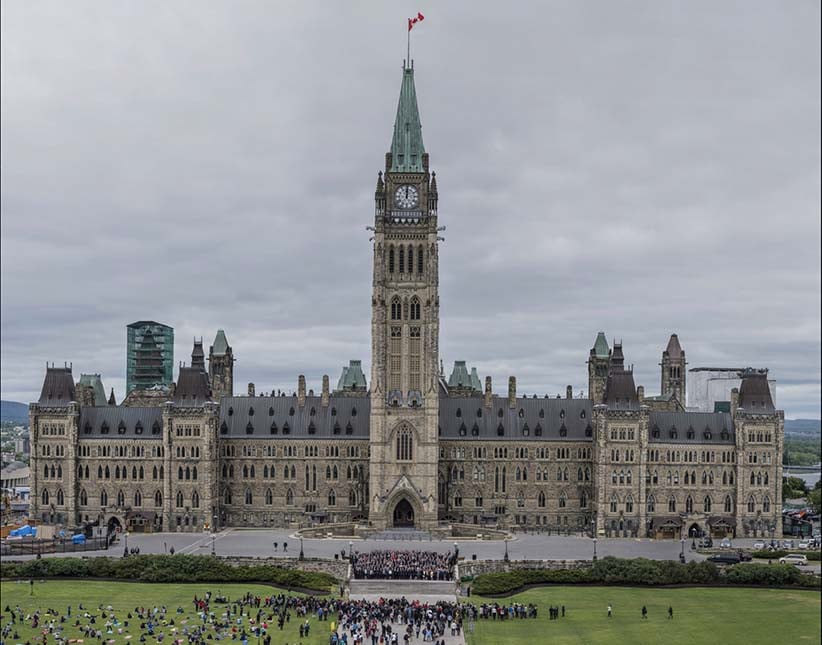Celebrating 150 years of Parliament Hill
On Wednesday, Ottawa celebrates 150 years of the legislature meeting on Parliament Hill. Here’s what they did on day one.
Parliament 1866
Share

On Wednesday afternoon, MPs gathered on Parliament Hill for the mother of all family photos. The photo shoot marked 150 years since the Legislature of the Province of Canada first met in the original Parliament Building. As for the photo itself, it was taken with a special high-resolution digital camera capable of displaying billions of pixels.
The anniversary offers a moment for those who obsess over what happens on Parliament Hill today to look at what went on back then. The Journals of the Legislative Assembly of Canada details what legislators got up to that day in June 1866. If you really want to, you can plough through it here yourself (or at least part of it—a subscription is required for the full version). But we’ll save you the time.
MORE: How a new Centre Block rose, a century ago, from Parliament’s ashes
Here are five things we learned from Parliament Hill’s first big day on June 8, 1866:
1. The looming Fenian Threat. In response to the threat from the Fenian Brotherhood, a society of Irish patriots living in America who sought to use Canada as a bargaining chip for Ireland’s independence from Britain, the first order of business saw John A. Macdonald (then the attorney general) introducing a crime bill to authorize “the apprehension and detention … of such persons as shall be suspected of committing acts of hostility or conspiracy against Her Majesty’s person and Government.”
Likewise, the second order was a defence bill “to protect the inhabitants of Lower Canada against lawless aggressions from subjects or Foreign Countries at peace with Her Majesty.”
2. Great expectations. It was the first day of the final session of the Province of Canada’s legislature. As such, Governor General Charles Monck gave a speech to the House about the “lawless band of Marauders” attacking from the south, praising Canada’s military response: “I must congratulate the Country that the first note of danger has shown that Canada possesses in her Volunteers, a body of men ready to peril their lives in defence of their Queen and Country.”
The Province of Canada’s finances were apparently in good shape, too. “I congratulate you upon the very satisfactory results of the commerce of the Country during the past year: the Revenue has been so largely in excess with the Estimates as to enable me, without inconvenience, to provide for the heavy and unexpected charges entailed upon the Country.”
Monck also had an eye to the new country about to be born the following year. “I venture to express the confident expectation that the next Parliament which will be held within these walls will not be confined to an Assembly of the Representatives of Canada, but will embrace those of all the Colonies of British North America.”
3. Committees get down to business. As with the modern Canadian Parliament, much of the business of government in 1866 was done in committees. Some of 24 standing committees in the current Parliament share similar names (like immigration and public accounts) but the list of committees also speaks to that time in history:
Privileges and elections
Expiring laws
Railways, canals and telegraph lines
Miscellaneous private bills
Standing orders
Printing
Contingencies
Public accounts
Banking and commerce
Immigration and colonization
4. But what about robocalls? Legislators also passed several resolutions that day reminding their colleagues that no, electoral fraud was not allowed. The House resolved it would proceed with “utmost severity” against anyone elected through “bribery or any other corrupt practices.” And in case anyone had any ideas, legislators were reminded it was a “high crime and misdemeanor” [sic] and “a subversion of the Constitution” to accept money to influence Parliament. Seven years later, Macdonald’s government was forced out of office in Canada’s first big political scandal, accused of doling out a railway contract in exchange for election funds.
5. No smoking in the Library. The House heard a detailed account about moving the Library of Parliament from Quebec to Ottawa “without any serious amount of injury.” Because the new library wasn’t finished, officials had to store everything in rooms throughout the new Parliament building. When those rooms filled up, “it was decided to make over to us a room which had been originally intended to serve as a Smoking Room for the use of Members of the Legislative Council.”